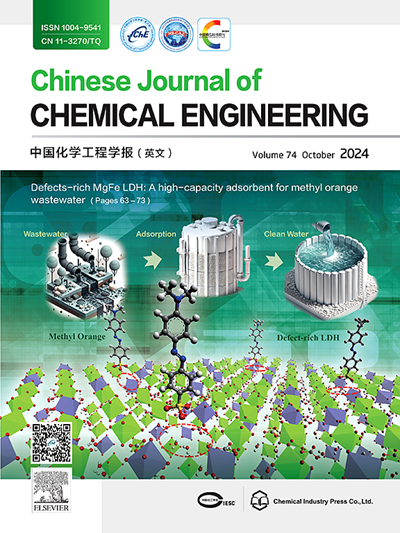工业过程故障监测的随机自回归动态慢特征分析方法
IF 3.7
3区 工程技术
Q2 ENGINEERING, CHEMICAL
引用次数: 0
摘要
基于核的慢特征分析(SFA)方法已成功应用于工业过程故障检测领域。然而,基于核的SFA方法在处理非线性时具有较高的计算复杂度,导致在检测时变数据特征时存在延迟。此外,核函数和核参数的不确定性限制了提取的特征表达过程特征的能力,导致故障检测性能较差。针对上述问题,提出了一种随机自回归动态慢特征分析(RRDSFA)方法,实现了对工业过程中工作点偏差和过程动态故障的同步监测,实现了对工业过程数据特征的实时监测。首先,本文提出的基于随机傅里叶映射的方法实现了更有效的非线性变换,而当前基于核的RDSFA算法可能导致显著的计算复杂度。其次,建立随机RDSFA模型提取非线性动态慢速特征;此外,为了克服随机傅里叶映射的随机性,建立了一种包含所有RRDSFA子模型的基于贝叶斯推理的整体故障监测模型。最后,通过数值算例和连续搅拌槽式反应器的仿真,验证了该监测方法的优越性和有效性。本文章由计算机程序翻译,如有差异,请以英文原文为准。

Randomized autoregressive dynamic slow feature analysis method for industrial process fault monitoring
Kernel-based slow feature analysis (SFA) methods have been successfully applied in the industrial process fault detection field. However, kernel-based SFA methods have high computational complexity as dealing with nonlinearity, leading to delays in detecting time-varying data features. Additionally, the uncertain kernel function and kernel parameters limit the ability of the extracted features to express process characteristics, resulting in poor fault detection performance. To alleviate the above problems, a novel randomized auto-regressive dynamic slow feature analysis (RRDSFA) method is proposed to simultaneously monitor the operating point deviations and process dynamic faults, enabling real-time monitoring of data features in industrial processes. Firstly, the proposed Random Fourier mapping-based method achieves more effective nonlinear transformation, contrasting with the current kernel-based RDSFA algorithm that may lead to significant computational complexity. Secondly, a randomized RDSFA model is developed to extract nonlinear dynamic slow features. Furthermore, a Bayesian inference-based overall fault monitoring model including all RRDSFA sub-models is developed to overcome the randomness of random Fourier mapping. Finally, the superiority and effectiveness of the proposed monitoring method are demonstrated through a numerical case and a simulation of continuous stirred tank reactor.
求助全文
通过发布文献求助,成功后即可免费获取论文全文。
去求助
来源期刊

Chinese Journal of Chemical Engineering
工程技术-工程:化工
CiteScore
6.60
自引率
5.30%
发文量
4309
审稿时长
31 days
期刊介绍:
The Chinese Journal of Chemical Engineering (Monthly, started in 1982) is the official journal of the Chemical Industry and Engineering Society of China and published by the Chemical Industry Press Co. Ltd. The aim of the journal is to develop the international exchange of scientific and technical information in the field of chemical engineering. It publishes original research papers that cover the major advancements and achievements in chemical engineering in China as well as some articles from overseas contributors.
The topics of journal include chemical engineering, chemical technology, biochemical engineering, energy and environmental engineering and other relevant fields. Papers are published on the basis of their relevance to theoretical research, practical application or potential uses in the industry as Research Papers, Communications, Reviews and Perspectives. Prominent domestic and overseas chemical experts and scholars have been invited to form an International Advisory Board and the Editorial Committee. It enjoys recognition among Chinese academia and industry as a reliable source of information of what is going on in chemical engineering research, both domestic and abroad.
 求助内容:
求助内容: 应助结果提醒方式:
应助结果提醒方式:


